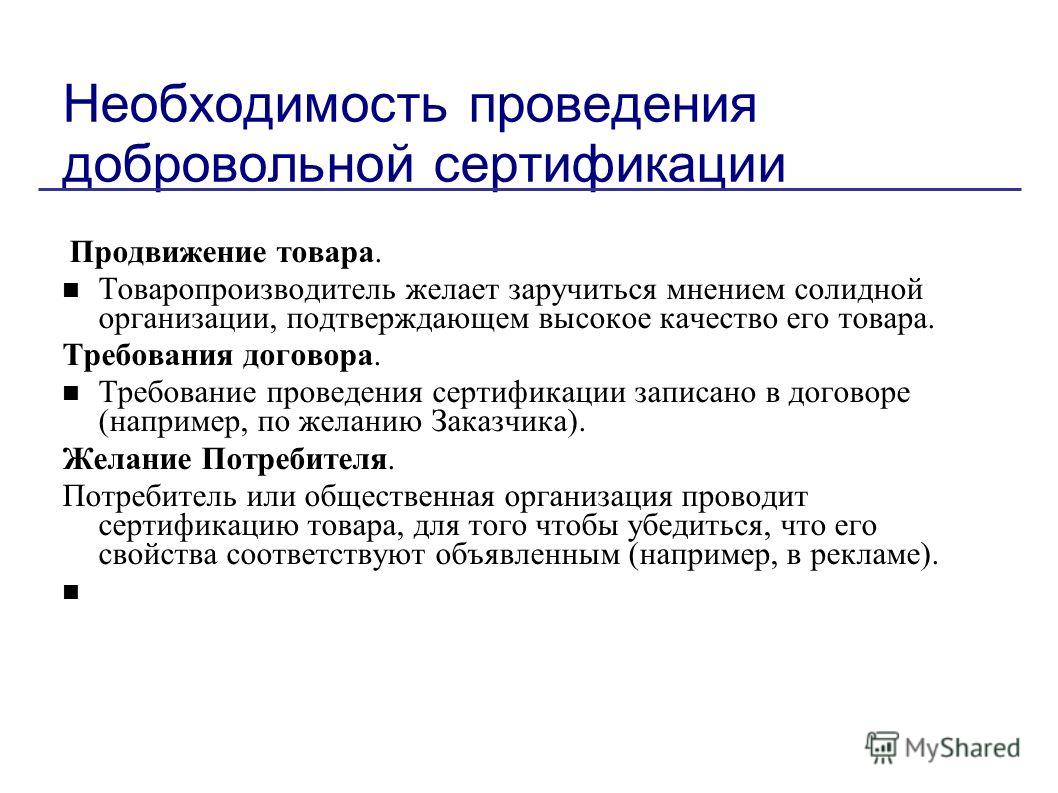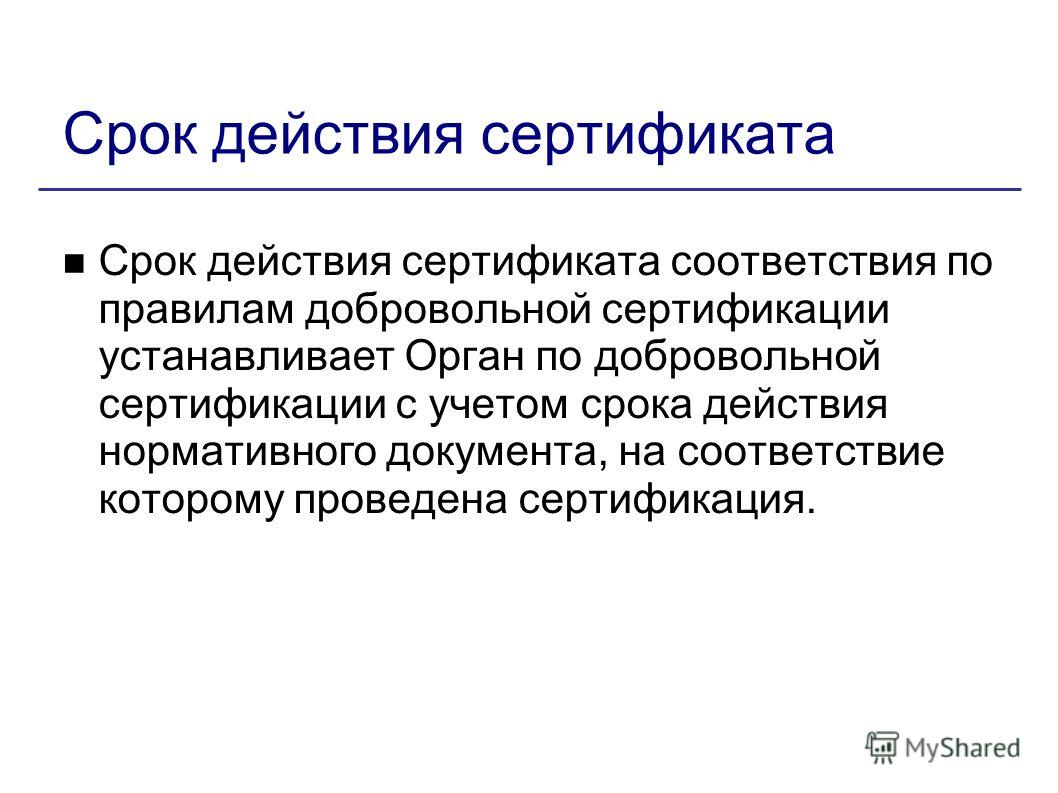Documentary evidence of the object's compliance with the established requirements
Page 3 of 8
21. What is meant by confirmation of conformity (in accordance with the Federal Law "On Technical Regulation")?
1. Documentary evidence of the conformity of products or other objects to the requirements technical regulations, the provisions of standards or the terms of contracts.2. Direct or indirect determination of compliance with the requirements for the object.
3. Establishing the identity of product characteristics to its essential features.
22. In what forms is the conformity assessment carried out (in accordance with clause 3, article 7 of the Federal Law "On Technical Regulation")?
1. State control(supervision).2. Accreditations.
3. Tests.
4. Registrations.
5. Confirmation of conformity.
6. Acceptance and commissioning of the facility, the construction of which is completed.
7. Different form.
8. None of the above forms.
23. What definition corresponds to the concept of "certification" (in accordance with the Federal Law "On Technical Regulation")?
1. A document certifying the compliance of an object with the requirements of technical regulations, the provisions of standards or the terms of contracts.2. Establishing the identity of product characteristics to its essential features.
3. The form of confirmation of compliance of objects with the requirements of technical regulations, the provisions of standards or the terms of contracts, carried out by the certification body.
4. Control (supervision) over compliance with the requirements of technical regulations.
24. What definition is given to the concept of "certificate of conformity" (in accordance with the Federal Law "On Technical Regulation")?
1. A designation used to inform purchasers about the compliance of the certification object with the requirements of the voluntary certification system or the national standard.2. A document certifying the object's compliance with the requirements of technical regulations, the provisions of standards or the terms of contracts.
3. A document in which, for the purpose of voluntary use, product characteristics, implementation rules and characteristics of the processes of its production, operation, storage, transportation, sale and disposal, performance of work or provision of services are established.
4. Document that is accepted international treaty of the Russian Federation and establishes mandatory requirements for the application and execution of requirements for objects of technical regulation.
25. What is the certification system in accordance with the Federal Law "On Technical Regulation"?
1. A set of rules for performing work on certification, its participants and the rules for the functioning of the certification system as a whole.2. The form of confirmation of compliance of objects with the requirements of technical regulations, the provisions of standards or the terms of contracts, carried out by the certification body.
3. Documentary evidence of the object's compliance with the requirements of technical regulations, the provisions of standards or the terms of contracts.
4. A certain procedure for documentary certification of the conformity of products or other objects with the requirements of technical regulations, the provisions of standards or the terms of contracts.
26. What is a standard according to the Federal Law "On Technical Regulation"?
1. A document in which, for the purpose of voluntary multiple use, product characteristics, implementation rules and characteristics of the processes of production, operation, storage, transportation, sale and disposal, performance of work or provision of services are established.2. A document certifying the object's compliance with the requirements of technical regulations, the provisions of standards or the terms of contracts.
3. A document adopted by an international treaty of the Russian Federation and establishes mandatory requirements for the application and implementation of requirements for objects of technical regulation.
4. A document certifying the conformity of products put into circulation with the requirements of consumers.
27. What is standardization according to the Federal Law "On Technical Regulation"?
1. Activities to establish rules and characteristics for the purpose of their voluntary multiple use, aimed at achieving orderliness in the areas of production and circulation of products and increasing the competitiveness of products, works or services.4. The form of confirmation of compliance of objects with the requirements of technical regulations, the provisions of standards or the terms of contracts, carried out by the certification body.
28. What is technical regulation in accordance with the Federal Law "On Technical Regulation"?
1. Activities to establish rules and characteristics for the purpose of their voluntary multiple use, aimed at achieving orderliness in the areas of production and circulation of products and increasing the competitiveness of products, works or services.2. Legal regulation relations in the field of establishment, application and execution mandatory requirements to products, production processes, operation, storage, transportation, sale and disposal, as well as in the field of establishing and applying on a voluntary basis requirements for products, production processes, operation, storage, transportation, sale and disposal, performance of work or provision of services and legal regulation of relations in the field of conformity assessment.
3. A certain procedure for documentary certification of the conformity of products or other objects with the requirements of technical regulations, the provisions of standards or the terms of contracts.
4. Form of confirmation of conformity of products to the requirements of technical regulations.
29. What is a technical regulation in accordance with the Federal Law "On Technical Regulation"?
1. Activities to establish rules and characteristics for the purpose of their voluntary multiple use, aimed at achieving orderliness in the areas of production and circulation of products and increasing the competitiveness of products, works or services.2. A document adopted by an international treaty of the Russian Federation, ratified in the manner prescribed by the legislation of the Russian Federation, or a federal law, or a decree of the President of the Russian Federation, or a decree of the Government of the Russian Federation, and establishes mandatory requirements for application and implementation of requirements for objects of technical regulation.
3. A certain procedure for documentary certification of the conformity of products or other objects with the requirements of technical regulations, the provisions of standards or the terms of contracts.
4. A document in which, for the purpose of voluntary multiple use, product characteristics, implementation rules and characteristics of the processes of production, operation, storage, transportation, sale and disposal, performance of work or provision of services are established.
30. What is the essence of the concept "form of confirmation of conformity" (in accordance with the Federal Law "On Technical Regulation")?
1. A set of rules for performing work on certification, its participants and the rules for the functioning of the certification system as a whole.2. Legal regulation of relations in the field of conformity assessment and the establishment, application and execution of mandatory and voluntary demands to products, production processes, operation, storage, transportation, sale and disposal.
3. Direct or indirect determination of compliance with the requirements for the object.
4. A certain procedure for documentary certification of the conformity of products or other objects, processes of production, operation, storage, transportation, sale and disposal, performance of work or provision of services with the requirements of technical regulations, provisions of standards or terms of contracts.
In the twentieth century The concept of consumer rights, including the right to complete reliable information about the quality of the purchased goods, has received intensive development. It was recognized that the consumer is a weak side in relation to the manufacturer: if the latter knows what he has produced, then the former sees only the external side of the product. To protect the consumer, it was necessary to proclaim his right to information and to oblige the manufacturer to provide it.
In serial (mass) production, statistical sampling methods began to be used, the meaning of which is simple: if you correctly take a certain part (sample) from a batch, then you can draw fairly reliable conclusions about the quality of the entire batch.
Certification in Russia began in 1993. in accordance with the Law of the Russian Federation "On the Protection of Consumer Rights", which established the mandatory certification of the safety of consumer goods.
Confirmation of compliance– documentary evidence of the conformity of products, works, services or other objects with the requirements of technical regulations, the provisions of standards or the terms of contracts.
Goals of conformity assessment
Confirmation of conformity is carried out in order to:
1. Certificates of compliance of products, production processes, operation, storage, transportation, sale and disposal, works, services or other objects with technical regulations, standards, terms of contracts;
2. Assistance to purchasers in the competent choice of products, works, services;
3. Increasing the competitiveness of products, works, services in the Russian and international markets;
4. Creation of conditions to ensure the free movement of goods across the territory Russian Federation, as well as for the implementation of international economic, scientific and technical cooperation and international trade.
Conformity assessment principles
Conformity assessment is carried out on the basis of the following principles:
1. Availability of information on the procedure for the implementation of conformity assessment to interested parties;
2. The inadmissibility of applying mandatory confirmation of conformity to objects in respect of which the requirements of technical regulations are not established;
3. Establishing a list of forms and schemes mandatory confirmation compliance with respect to certain types of products in the relevant technical regulation;
4. Reducing the time for the implementation of mandatory confirmation of conformity and the costs of the applicant;
5. Inadmissibility of coercion to carry out voluntary confirmation of conformity, including in a certain system of voluntary certification;
6. Protection of property interests of applicants, observance of trade secrets in relation to information obtained in the course of conformity assessment;
7. Inadmissibility of replacing the mandatory confirmation of compliance with voluntary certification.
Compliance Forms
Conformity assessment on the territory of the Russian Federation may be voluntary or mandatory.
Voluntary confirmation of compliance is carried out only in the form voluntary certification.
Mandatory confirmation of compliance is carried out in the following forms:
adoption of a declaration of conformity (declaration of conformity);
mandatory certification.
The procedure for applying the forms of mandatory confirmation of conformity is established by the Federal Law "On technical regulation».
Certification is a procedure by which a third party certifies in writing that a product, process or service conforms to specified requirements.
Third party - a person or body recognized as independent of the parties involved in the issue under consideration. The parties involved are manufacturers, sellers, performers, consumers or other entities representing their interests. The participation of a third party in conformity assessment is the main feature of certification.
The general concept of certification follows from the etymology of the word "certificate" (lat. certum - right, facere - to do), i.e. "done right". A certificate certifies the existence of some fact, for example, the origin of a product, its authenticity, etc. The most common use of certification is to confirm the compliance of an object with the requirements established for it.
Topic 8. Means of confirmation of conformity A certain procedure for documentary certification of the conformity of products or other objects, processes of production, operation, storage, transportation, sale and disposal, performance of work or provision of services with the requirements of technical regulations, provisions of standards or terms of contracts is called a form of confirmation of conformity
Conformity assessment Documentary evidence of conformity of products or other objects, processes of production, operation, storage, transportation, sale and disposal, performance of work or provision of services with the requirements of technical regulations, provisions of standards or terms of contracts is called conformity assessment
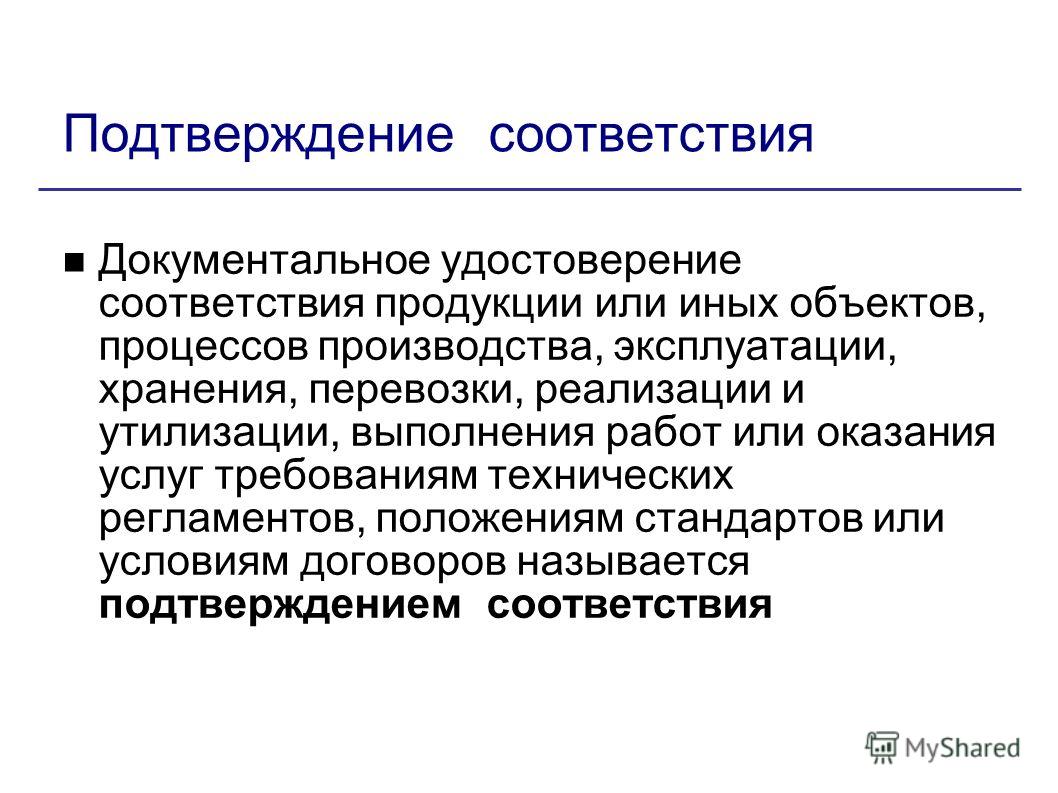
Conformity assessment Compliance is compliance with all specified requirements for a product, process and service. Conformity assessment involves comparing the actual level of quality achieved established requirements. conformity assessment - direct or indirect determination of compliance with the requirements for an object;
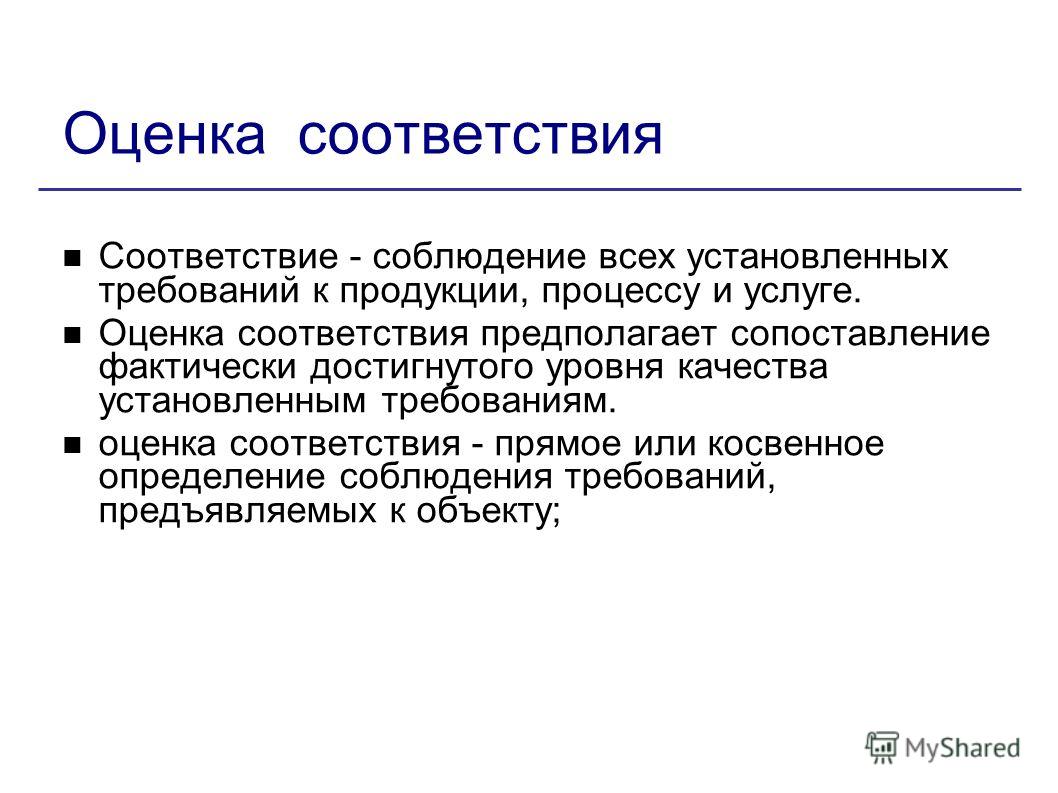
Quality assessment Quality assessment is a set of operations for choosing the nomenclature of quality indicators, determining their actual value and comparing them with the base ones. Any indicators can be chosen to assess the quality, incl. and not provided for by ND, for example, characteristics from the everyday experience of the consumer. Quality assessment can be carried out by any subjects market relations: manufacturers, sellers, consumers. The final document can be formatted as technical document(conclusion, act of examination, quality certificate, specification)
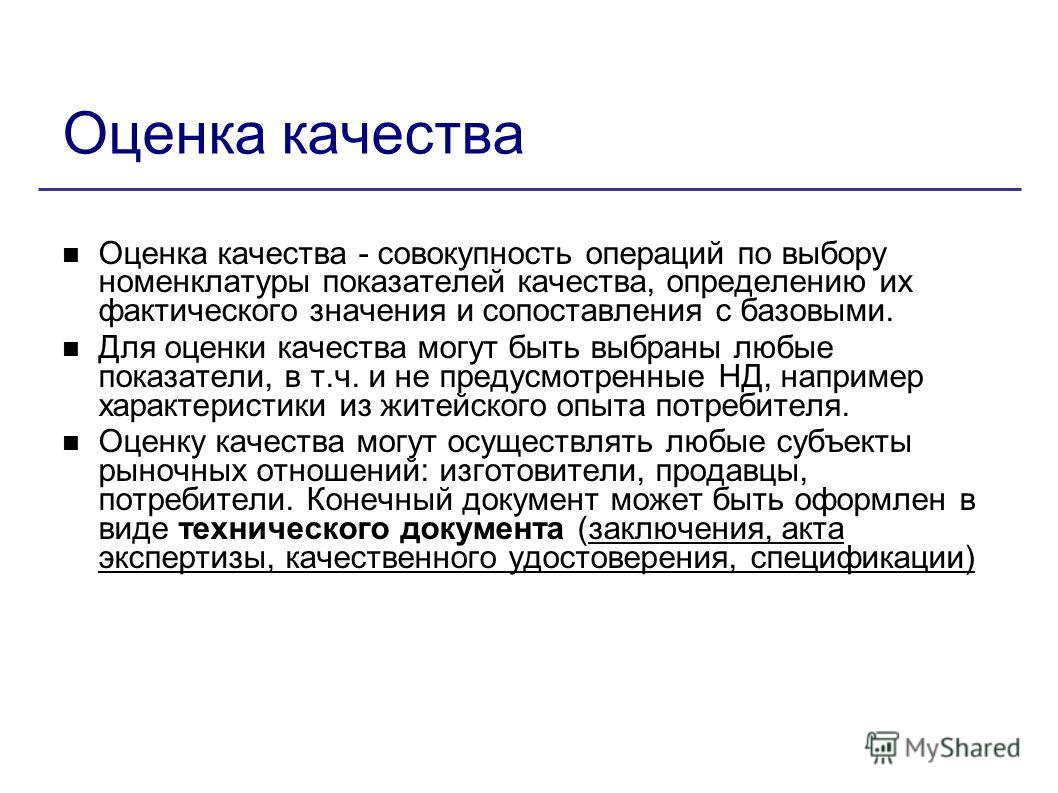
Quality control Quality control - verification of compliance with the requirements established by ND. Quality control is carried out by representatives of the competent control bodies (inspectors of the State Trade Inspectorate, Gosstandart, sanitary doctors of the State Sanitary and Epidemiological Supervision, employees of the testing laboratory). The range of indicators to be checked is limited only by the requirements stipulated by the ND, and it can be complete or limited to several indicators (for example, organoleptic). The end result may be an inspection report drawn up by a commission or by one person.
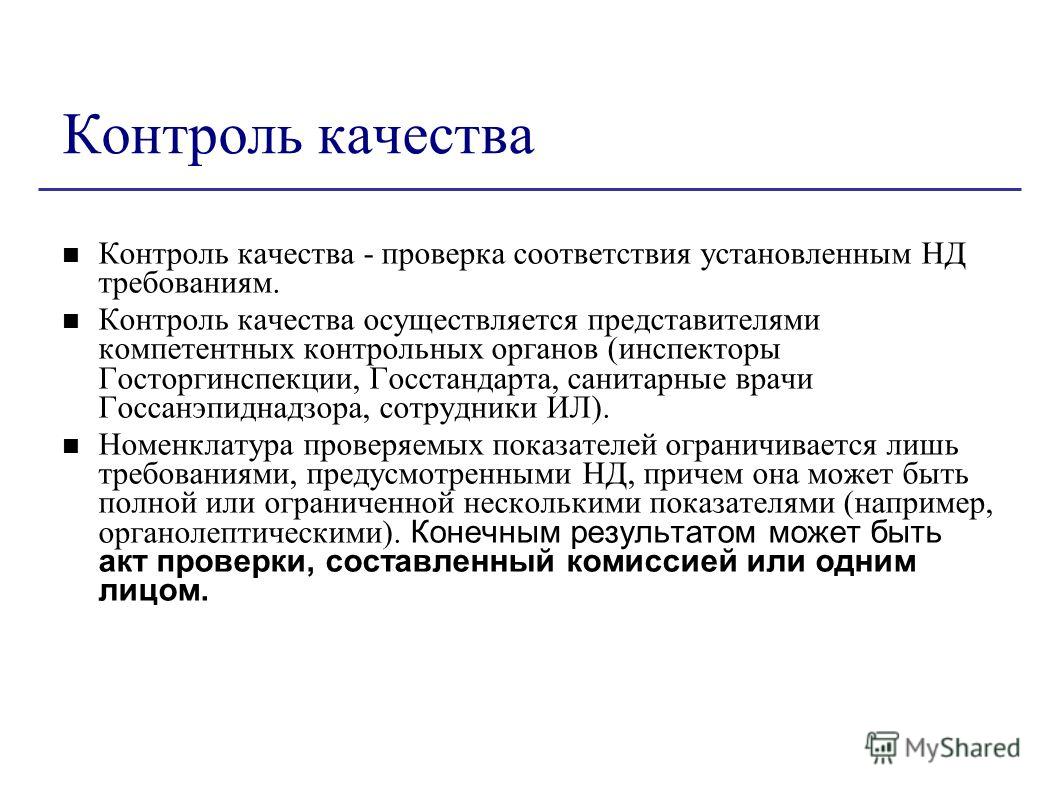
Certification Certification is the act of a third party that creates confidence that a properly identified product conforms to specified requirements. Unlike quality assessment and quality control necessary condition proper product identification is regulated.
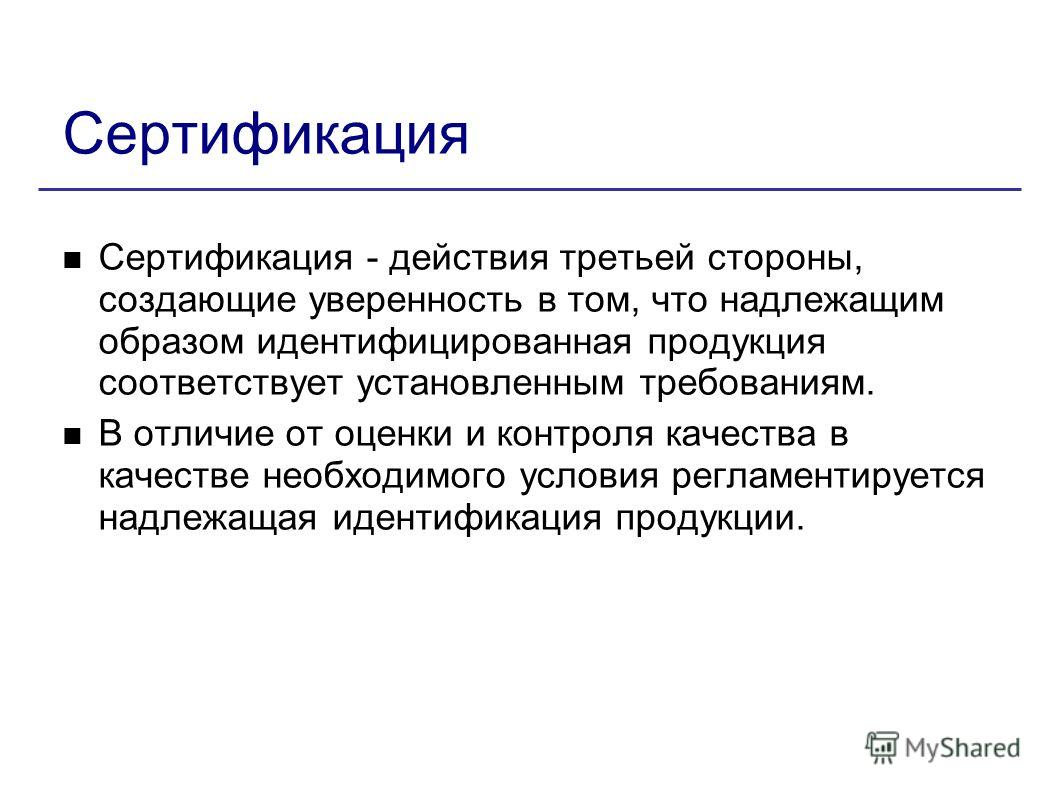
Identification of products Identification of products - establishing the identity of the characteristics of products to its essential features In accordance with the law of the Russian Federation "On packaging and labeling in the field of consumer goods and services", identification is the establishment of the conformity of the name of the product indicated on the label or in accompanying documents with the requirements imposed on it.
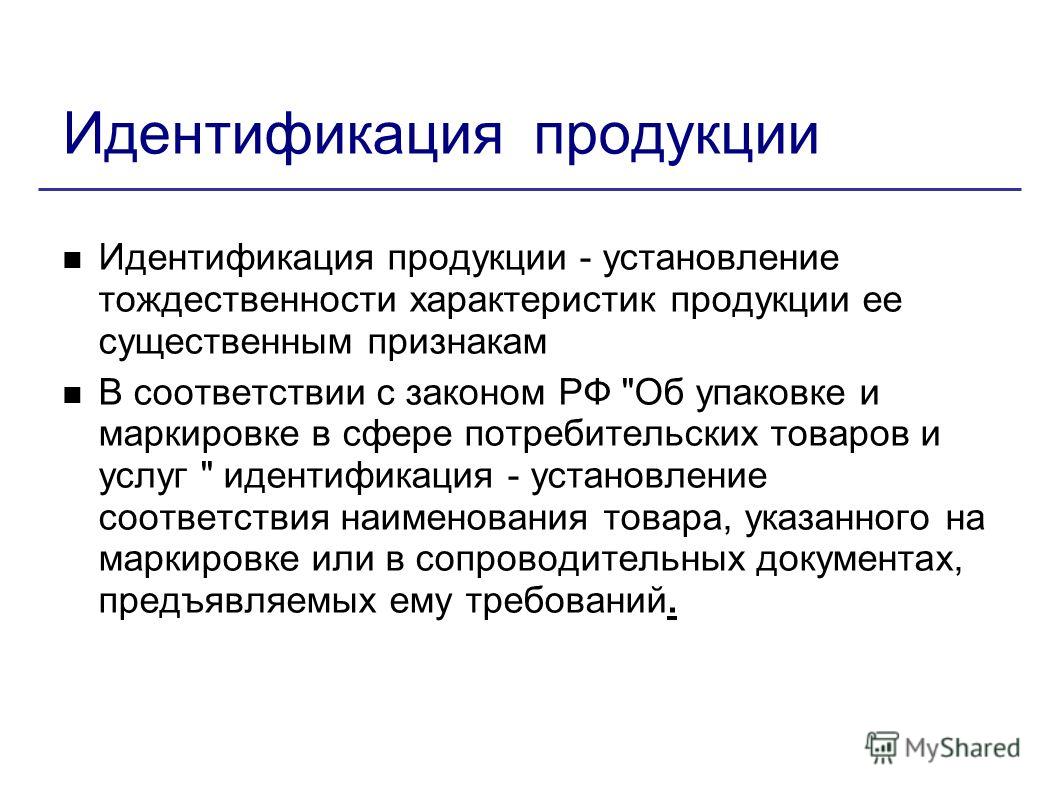
Accreditation Accreditation - official recognition by the accreditation body of the competence of an individual or legal entity to perform work in a specific area of conformity assessment; Successful certification is possible only with the high competence of certification participants in testing and verification, mutual trust in each other. An accreditation mechanism is needed to determine the impartiality, independence and competence of certification participants.
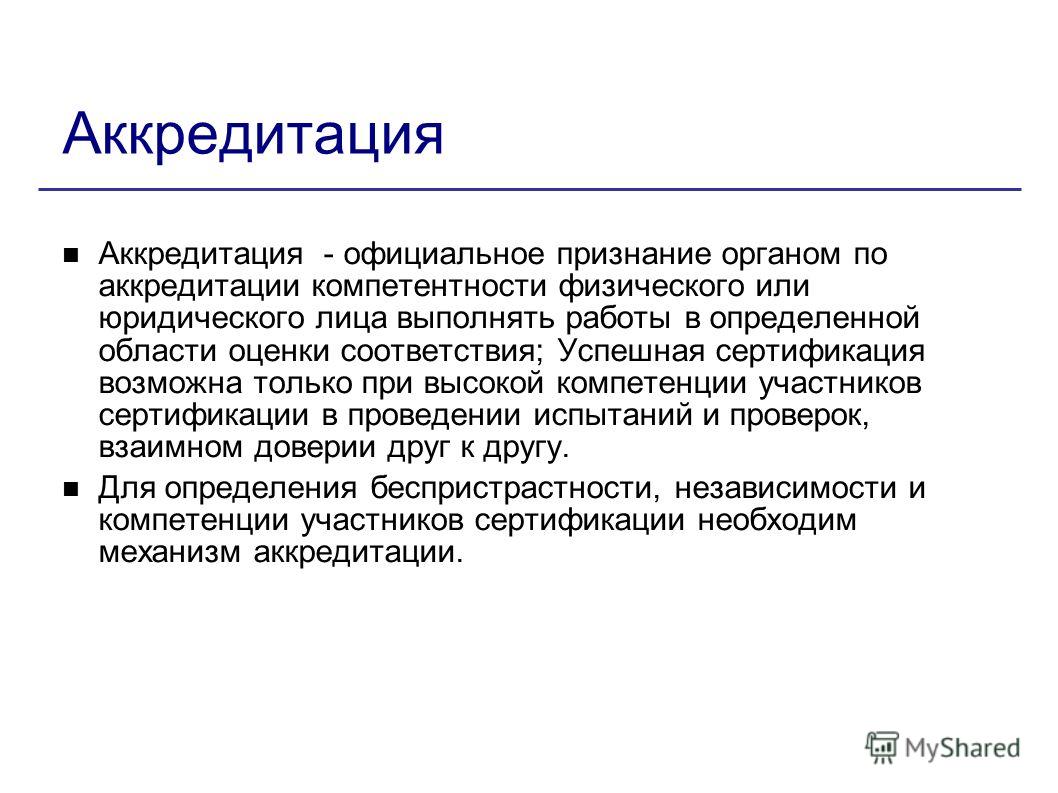
Certification The term certification in commercial activities and in Everyday life became known relatively recently, as the certification procedure has been used for a long time and the term "certification" has been known since the 19th century. AT financial sector a certificate is a monetary certificate for a certain amount or a bond of a social state loan
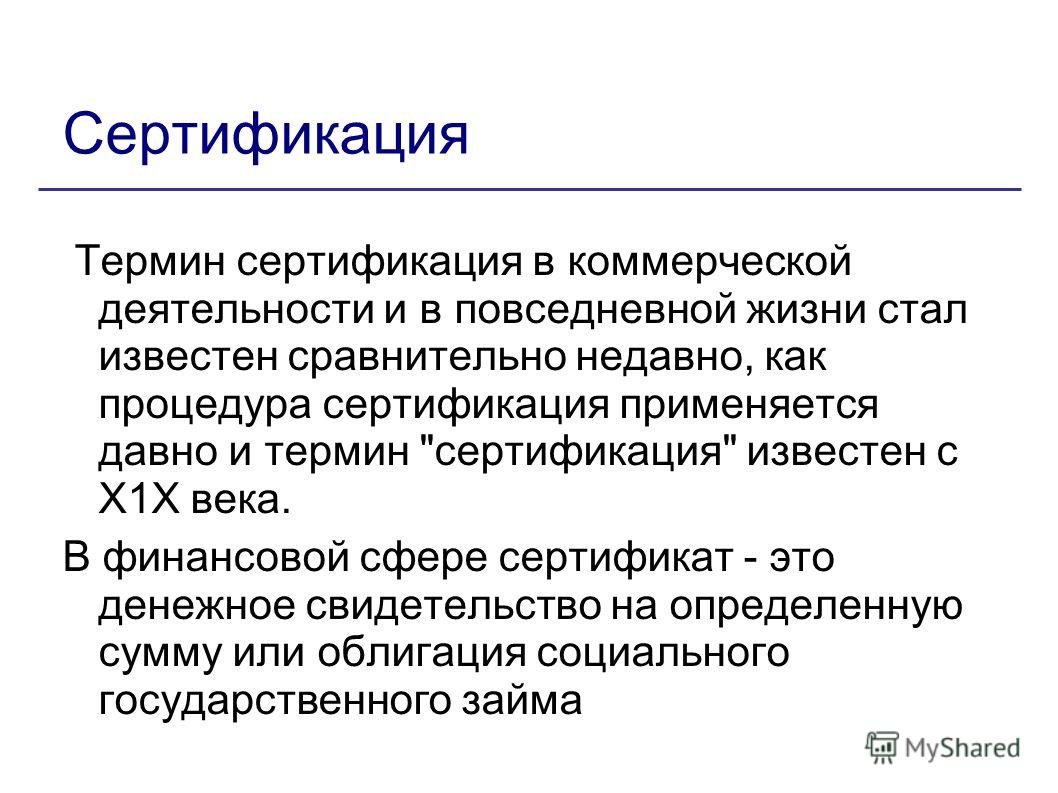
Certification in metrology Certification in metrology is known as the activity of officially checking and stamping (or sealing) instruments (balances, weights). Hallmarking certifies that the device meets the certification requirements for its design and metrological characteristics. The term "certificate" has been used in international metrological practice for more than a hundred years.
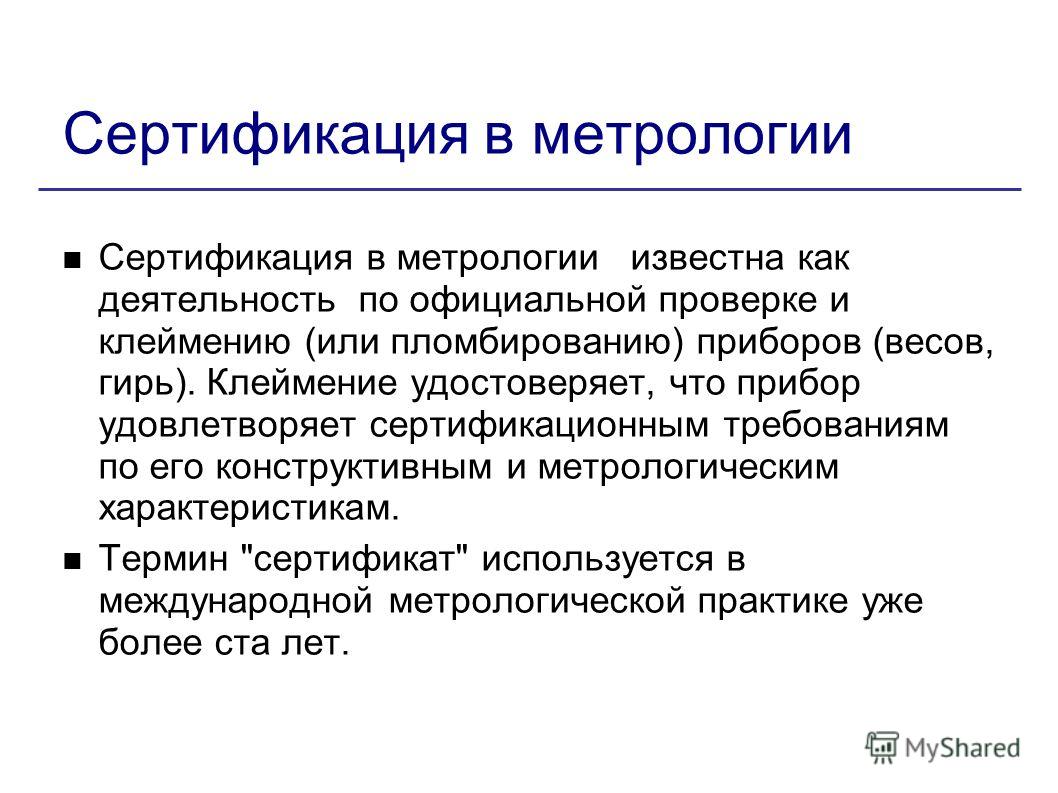
Certificate of the International Bureau of Weights and Measures Accompanying document to the Russian prototype of the kilogram, received in 1879. had the title: "International Committee for Weights and Measures. Certificate of the International Bureau of Weights and Measures for the prototype of the 12 kilogram, transferred to the Ministry of Finance Russian Empire". It contains information about the manufacturer of prototypes and their certification, about chemical composition and volume, i.e. all identification features are set out (an example of certification by a third party - the International Bureau of Weights and Measures).
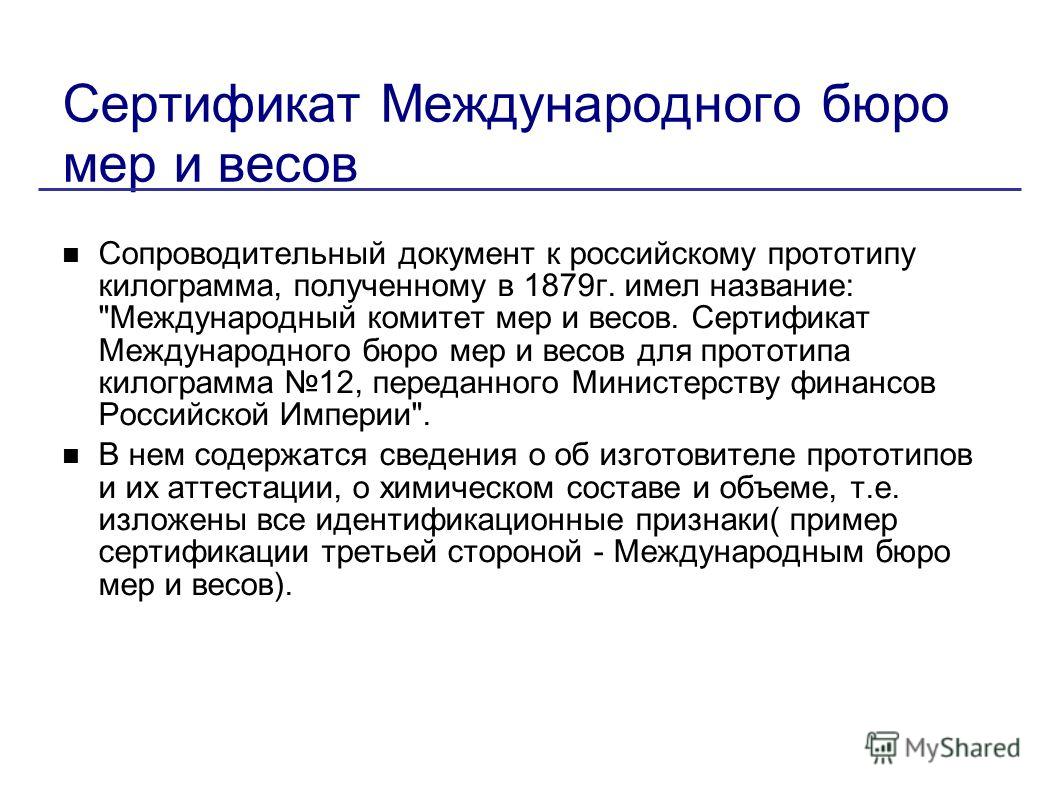
Lloyd's Register-certificate An example of a classification organization that assesses the safety of ships for insurance purposes (non-governmental and independent), operating for several centuries), is the Lloyd's Register - authoritative in our time international organization with representations in 127 countries, being the leader of the certification organizations.
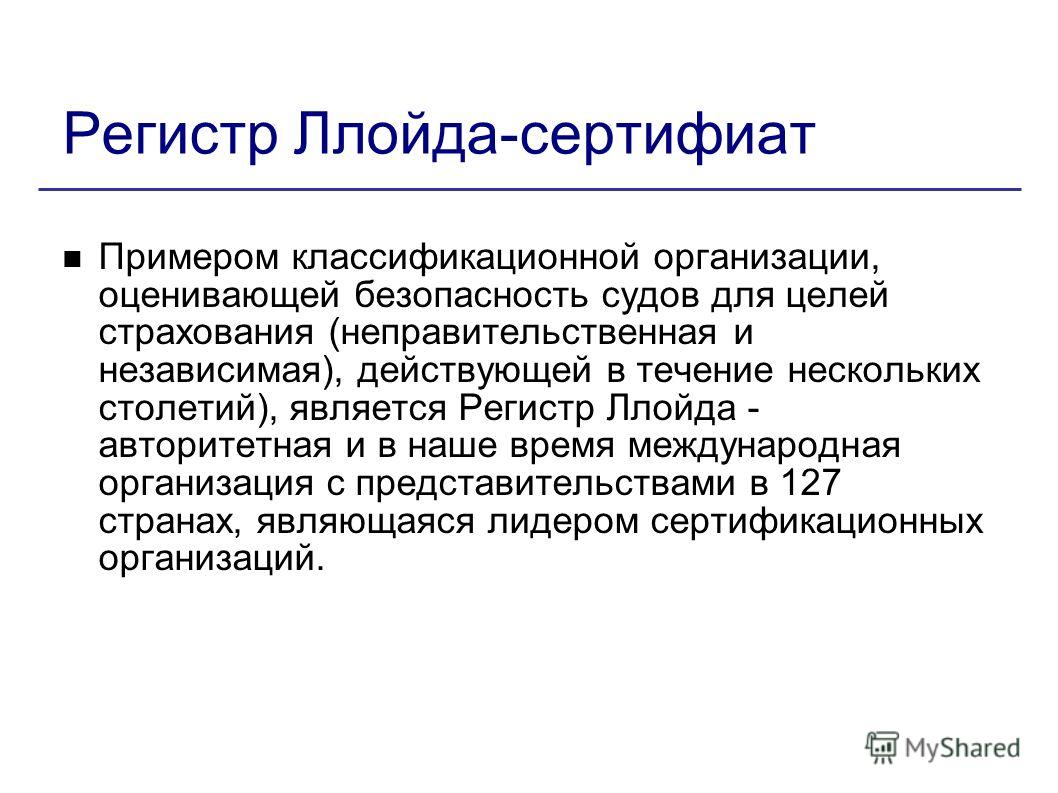
LEGISLATIVE ACTS OF THE RUSSIAN FEDERATION ON THE BASIS OF WHICH MANDATORY CERTIFICATION OF PRODUCTS AND SERVICES IS CARRIED OUT IN THE GOST R CERTIFICATION SYSTEM - Law of the Russian Federation "On Protection of Consumer Rights" - Law of the Russian Federation "On Veterinary Medicine" - Law of the Russian Federation "On Weapons" - the federal law"About security traffic"- Federal Law "On the State Material Reserve" - Federal Law "On the Basics of Labor Protection in the Russian Federation"

LEGISLATIVE ACTS OF THE RUSSIAN FEDERATION - Federal Law "On the engineering and technical system of the agro-industrial complex" - Federal Law "On state regulation ensuring the fertility of agricultural land" - Federal Law "On Energy Saving" - Federal Law "On the Safe Handling of Pesticides and Agrochemicals" - Federal Law "On industrial safety dangerous production facilities- Federal Law "On Quality and Safety food products"- Federal Law "On State Regulation of the Production and Turnover of Ethyl Alcohol, Alcohol and Alcohol-Containing Products"
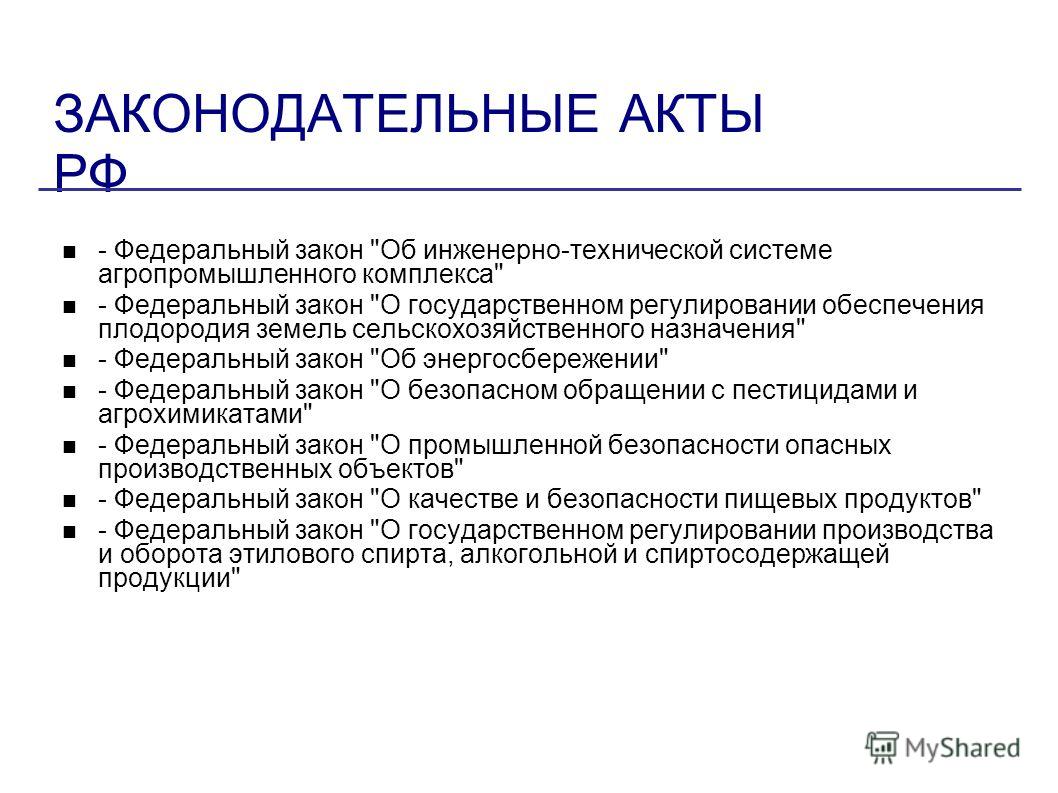
Regulation of Relations between the State, Consumers and Producers legal entities and individual entrepreneurs in the course of state control (supervision)”.
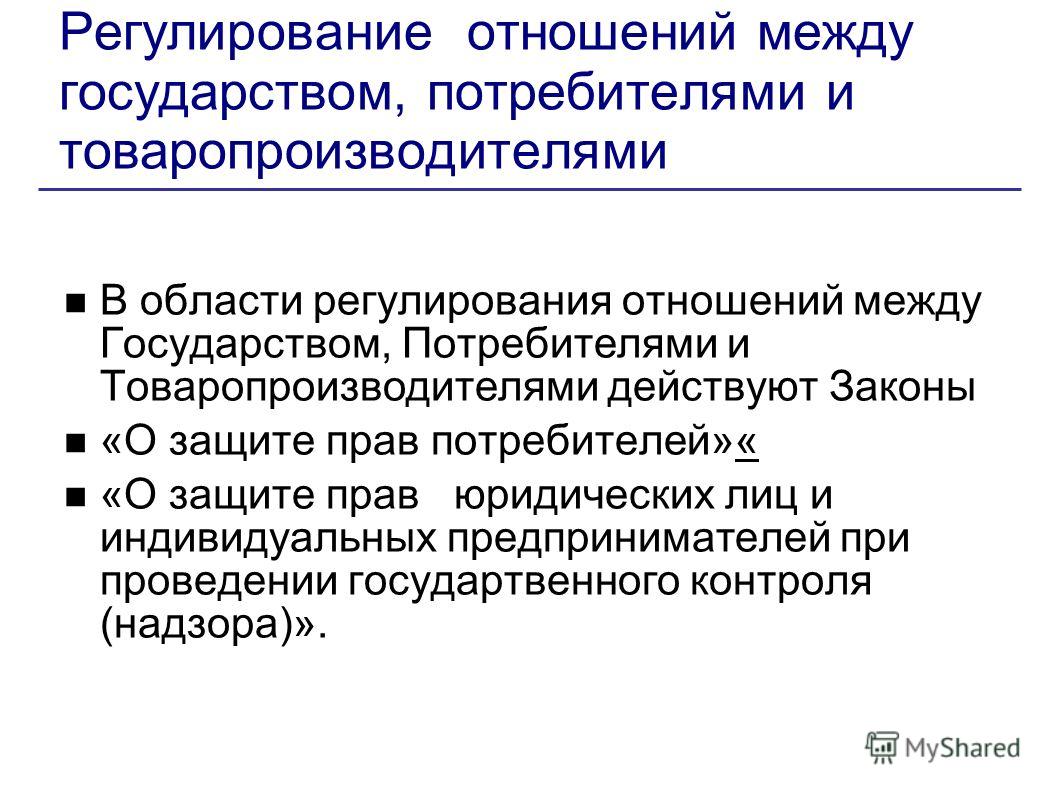
In the law of the Russian Federation "On technical regulation" are indicated legal framework mandatory and voluntary certification of products, services and other objects. The law sets out the concepts: "certification of products" and the objectives of certification. Products are the result of activities or processes. Products may include services, equipment, material processing, software, or combinations of these. Products can be tangible, for example: components, materials or non-materials, for example: information or concepts, or combinations of them.
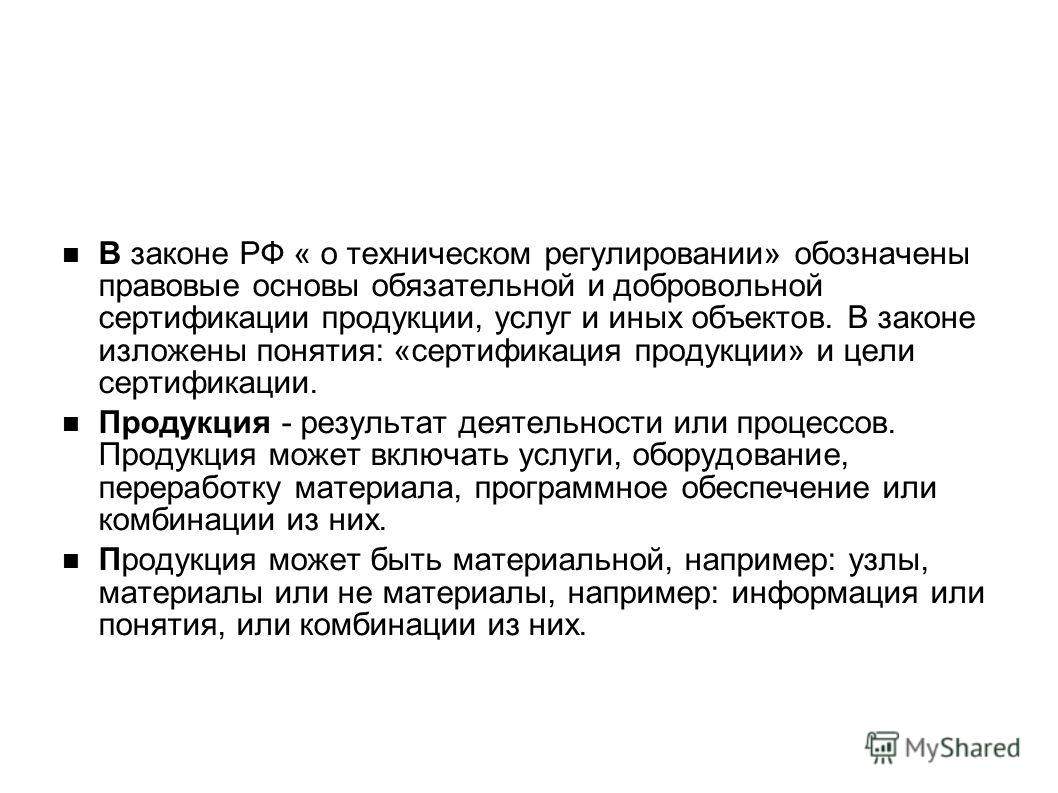
Preparation for certification Many enterprises during the period of preparation achieve: improvement of technological discipline; reduction of "bottlenecks"; prompt response to the appearance of deviations from the required quality level; establishing quantitative and qualitative criteria for the stability of production; improving the culture of production; creation at the enterprise of a special unit in charge of certification issues, etc.
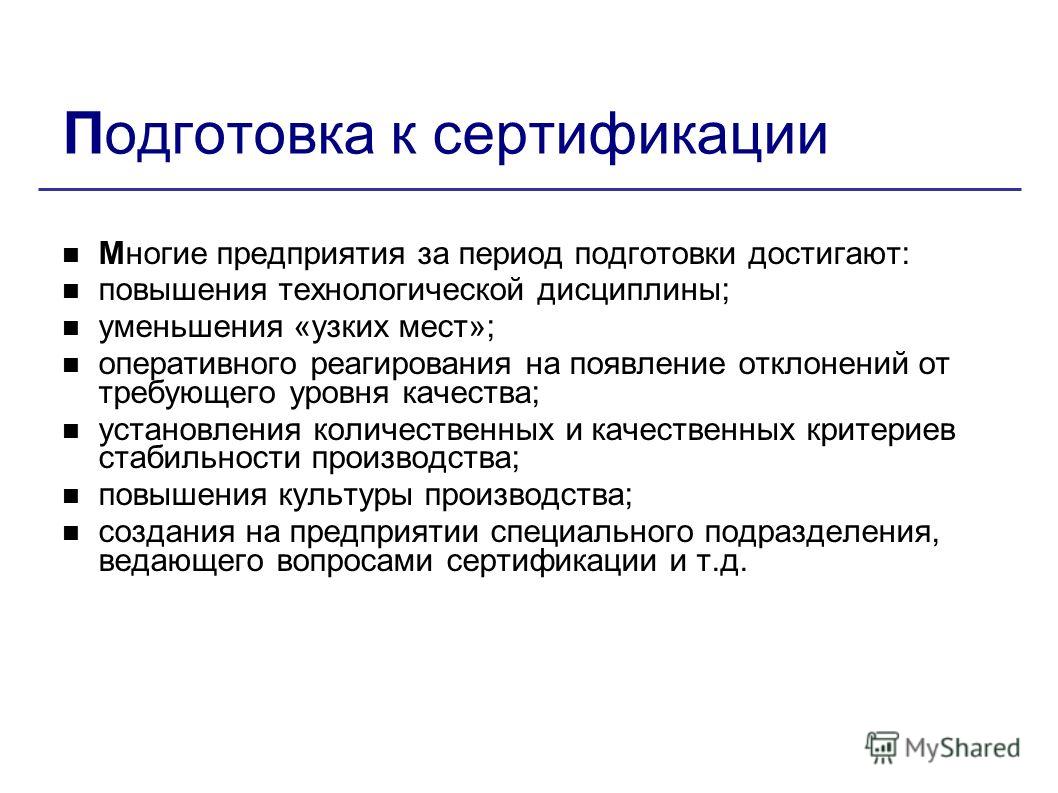
Legal relationship Supplier-Consumer The relationship system Supplier-Consumer is based on the rights of the parties: Consumer - to receive reliable information about the quality of products; Consumer (society) - to receive safe and environmentally friendly products; Consumer (Customer) - the right to inspect the Supplier's quality systems; Supplier - the right to protection against unreasonable claims of the Consumer.
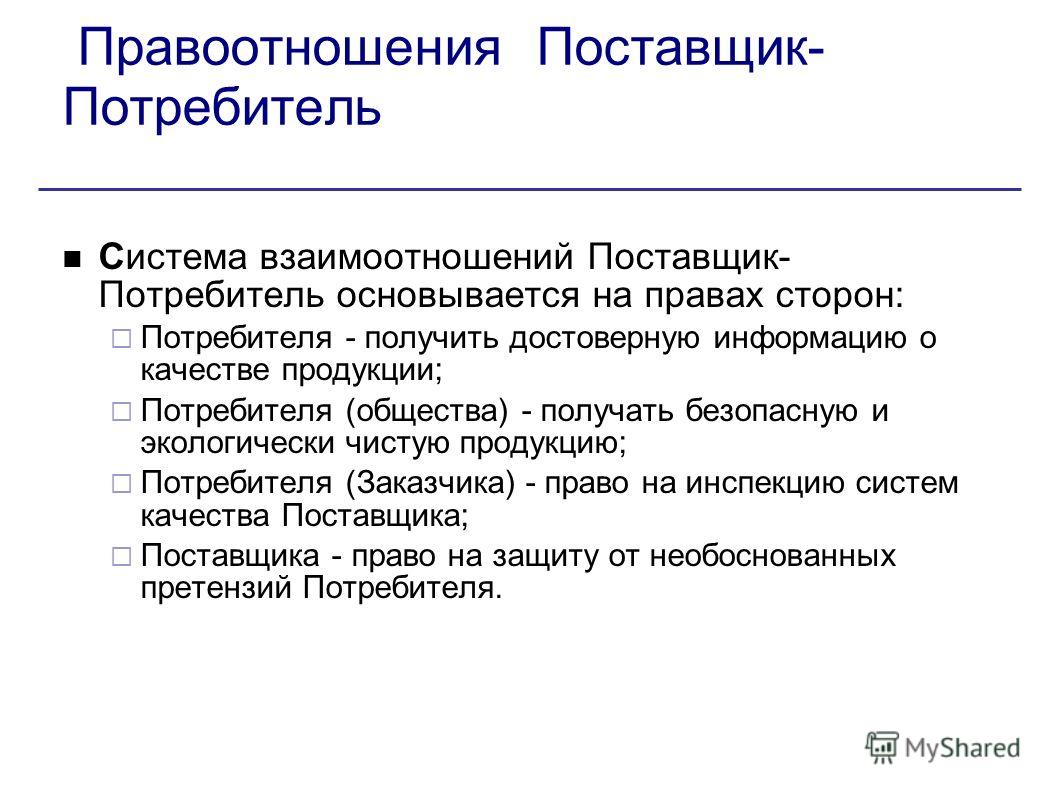
Use of international standards for certification The national system allows the direct use of international standards; standards are adapted for certification purposes. The Law of the Russian Federation "On Trademarks, Service Marks and Appellations of Origin" provides for the labeling of products approved by the mark in confirmation of the quality established by the relevant standard. The figures show conformity marks (GOST R).
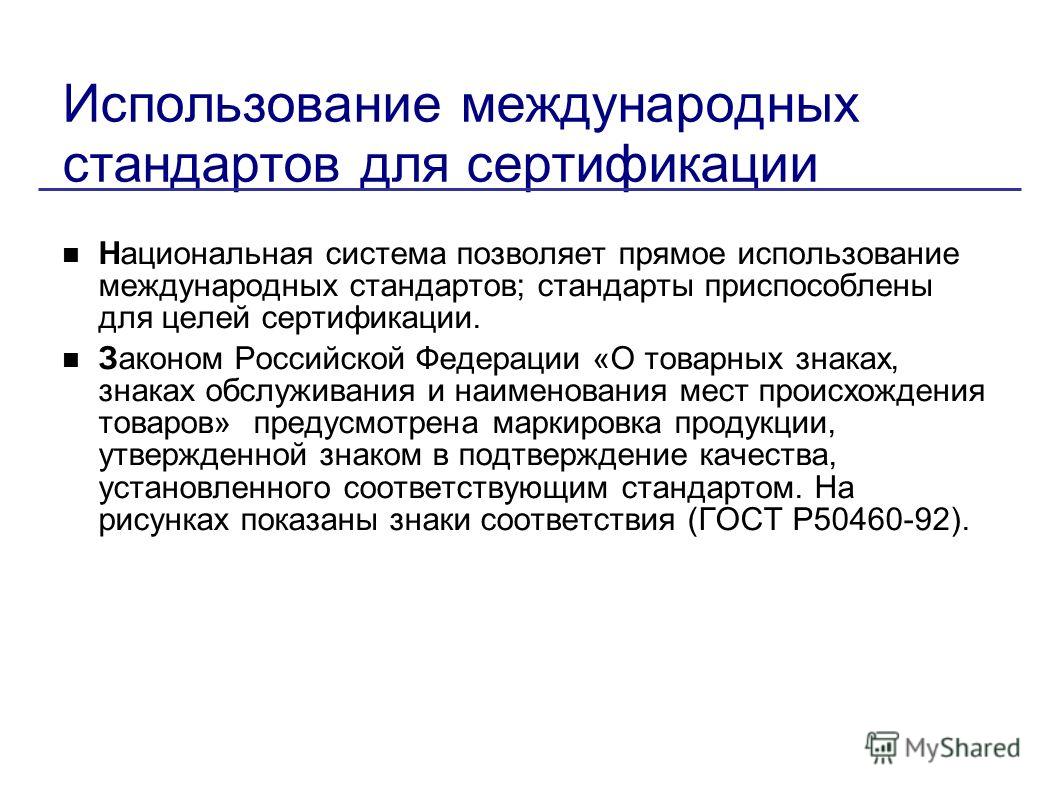
Classifiers, lists and nomenclatures Certification works use: All-Russian classifier products” (OKP) to designate and identify products using a 6-digit code; "All-Russian classifier of services to the population" (OKUN) for designation and identification using a 6-bit code of works and services; international classifier "Commodity nomenclature of foreign economic activity(TN VED)" for designation and identification using a 9-digit code for import and export products, etc.
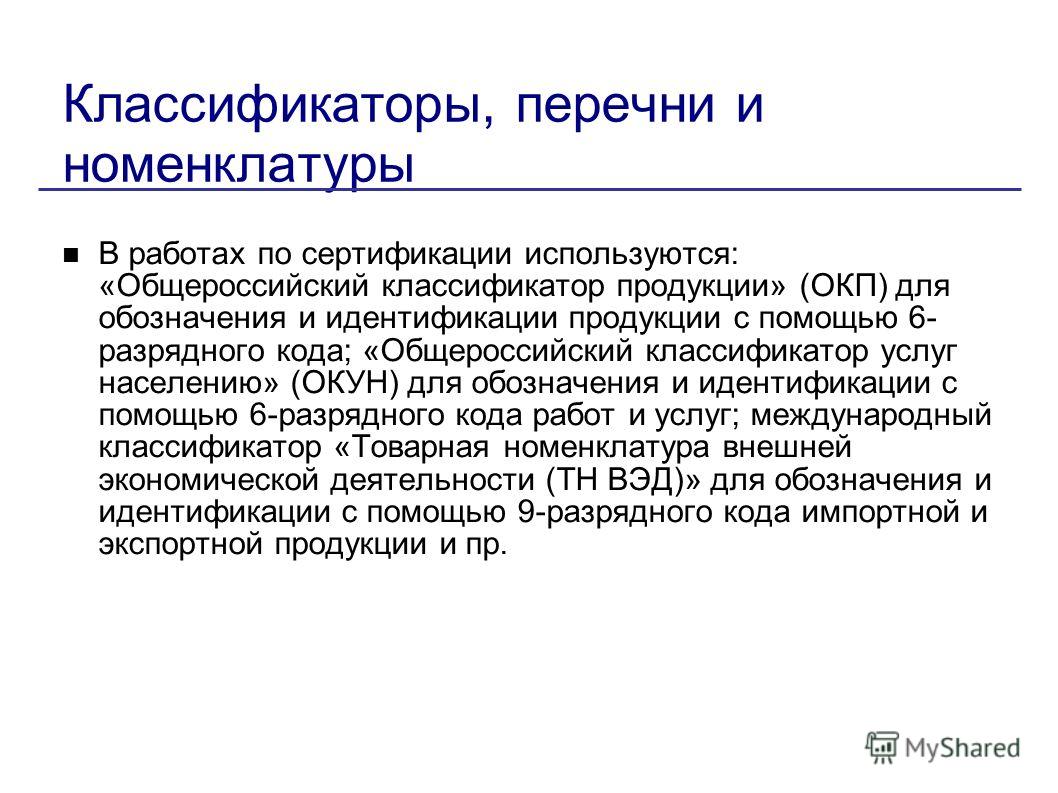
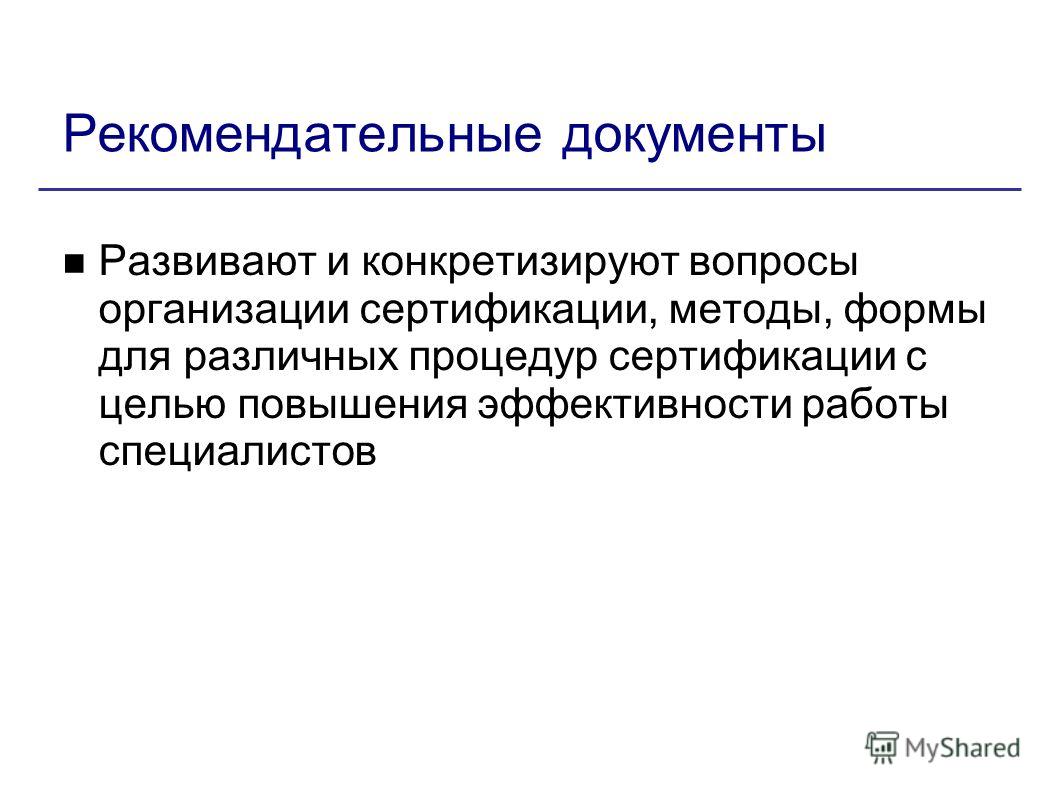
Reference information materials These materials contain extended information about the objects registered in the State Register (about products, certification systems, OS, IL, experts). Unlike the above documents, which are full-text, they represent factual databases contained in the State Register. For any details relating to the OS, IL, experts, standards, you can get information in reference information materials
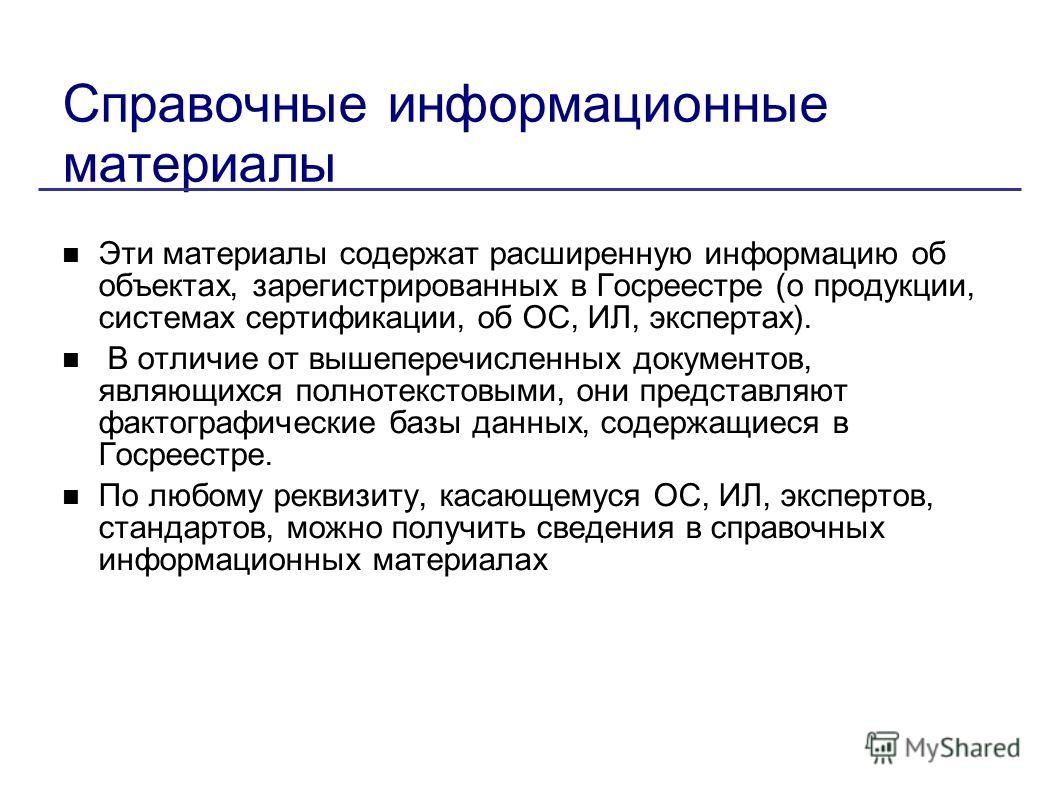
Before the adoption of the lawAfter the adoption of the law Documents that establish requirements for safety performance Standards and systems of standards. Lists of products that require mandatory confirmation of compliance with safety requirements are given in the Decree of the Government of the Russian Federation Technical Regulations, which contain exhaustive lists of safety requirements for a product group. The role of standards Documents containing requirements for both safety and other characteristics of products and processes Ensuring uniformity of measurements, compatibility, uniformity of terminology, marking and packaging. Typical technical solutions and sets of quality requirements. The status of the organization conducting mandatory certification Government body. GOST R system Any certification body accredited in a given area of certification and using the services of control and measurement laboratories certified for this type of measurement. Quantity regulatory documents that define the requirements for this type of product From a few units to several hundreds Several technical regulations on the main areas of safety. Laws establishing requirements for technical regulation Laws of the Russian Federation “On Standardization”, “On Certification of Products and Services” Law of the Russian Federation “On Technical Regulation” “On Technical Regulation”
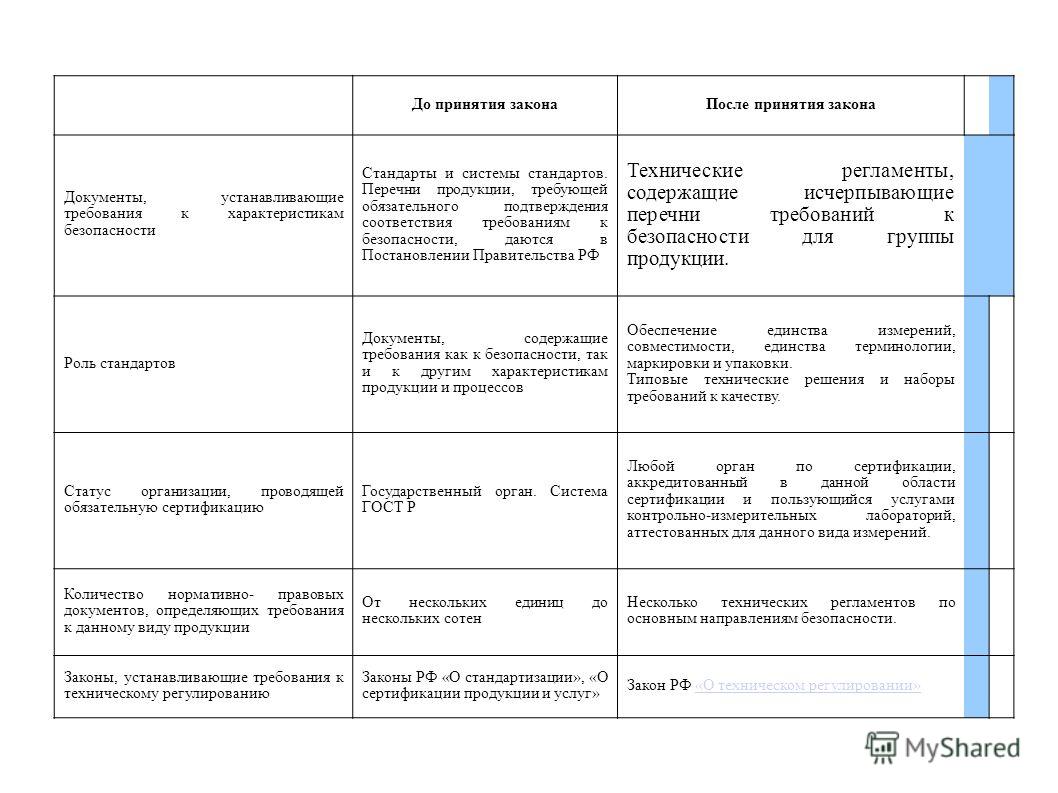
First: certification is now directly related to the action of a third party, which is a person or body recognized as independent of the parties involved in the matter under consideration. Secondly, the conformity assessment activity is carried out properly, which indicates the presence of a strict certification system that has certain rules, procedures and management. Thirdly: the scope of certification is expanding, processes, products and services are currently subject to it, incl. quality management processes in enterprises (quality systems) and personnel
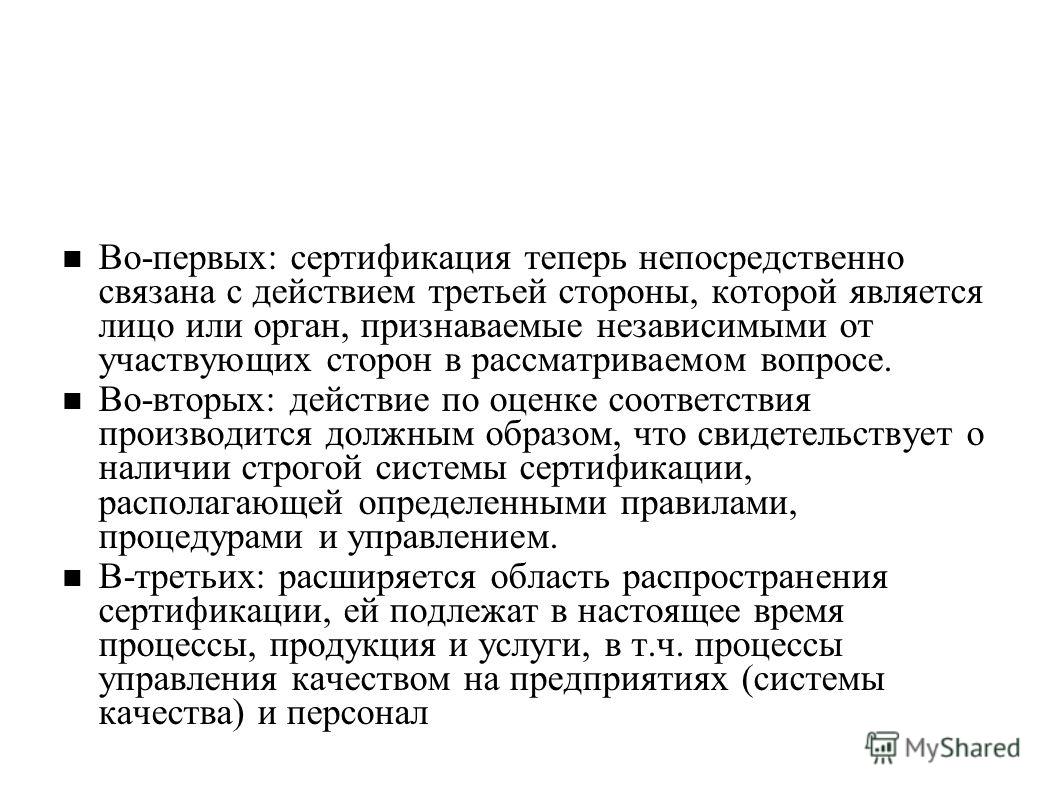
Voluntary certification systems Voluntary certification systems are marked by the following features: the active role of the Applicant, who determines the confirmed requirements for the object of certification, methods for their verification, standards or others regulations, establishing the requirements, selects the certification scheme; self-organization of the system, i.e. initiation of its creation and registration by any subjects economic activity;
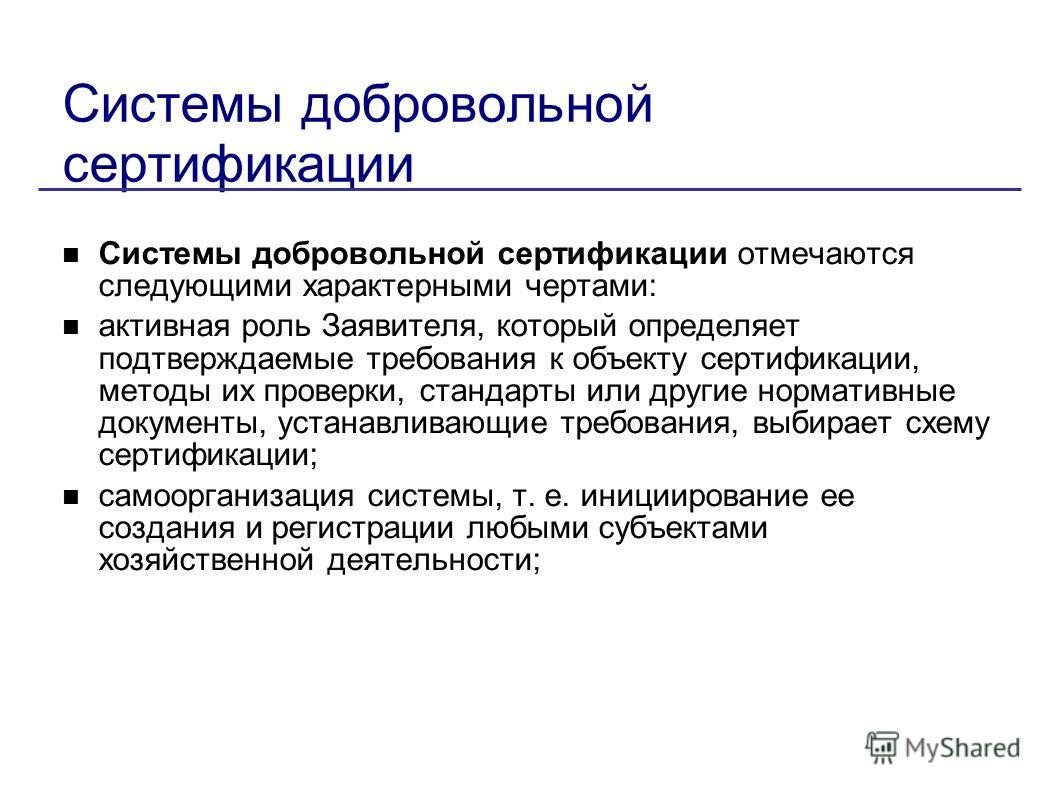
Character traits Voluntary certification systems openness, the opportunity for interested parties to get acquainted with the composition of the participants in the system, the rules and procedures for certification; independence, non-interference of federal and local authorities executive power, other state and public structures into the activities of the system (if they are not its organizers
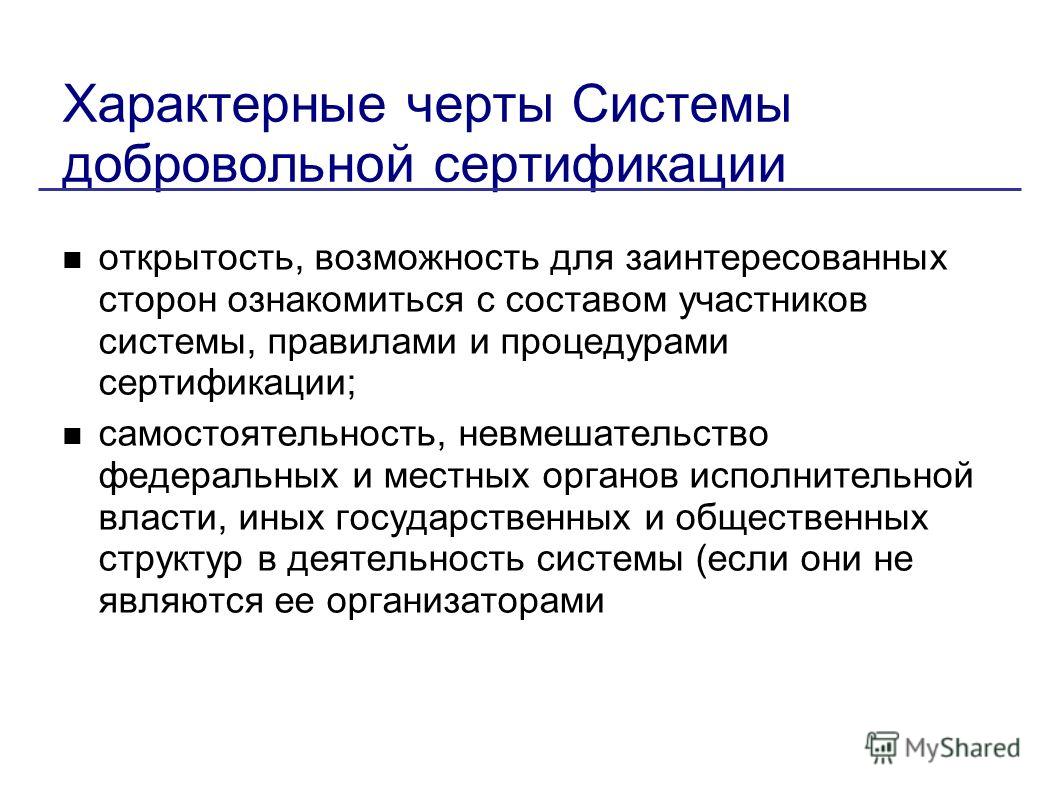
The need for voluntary certification Promotion of goods. The commodity producer wishes to enlist the opinion of a reputable organization confirming high quality his goods. contract requirements. The requirement for certification is written in the contract (for example, at the request of the Customer). Consumer Desire. Consumer or public organization carries out certification of the goods in order to make sure that its properties correspond to those declared (for example, in advertising).
